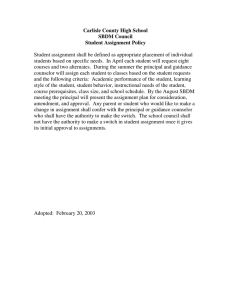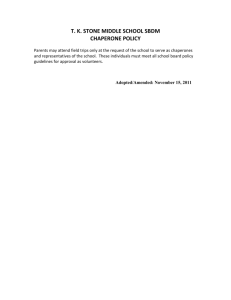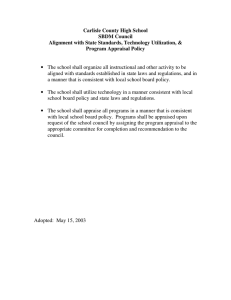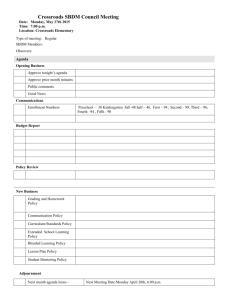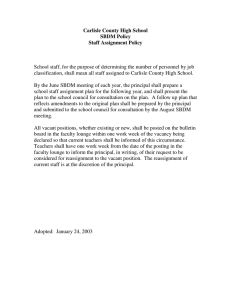Selection of Instructional Materials
advertisement
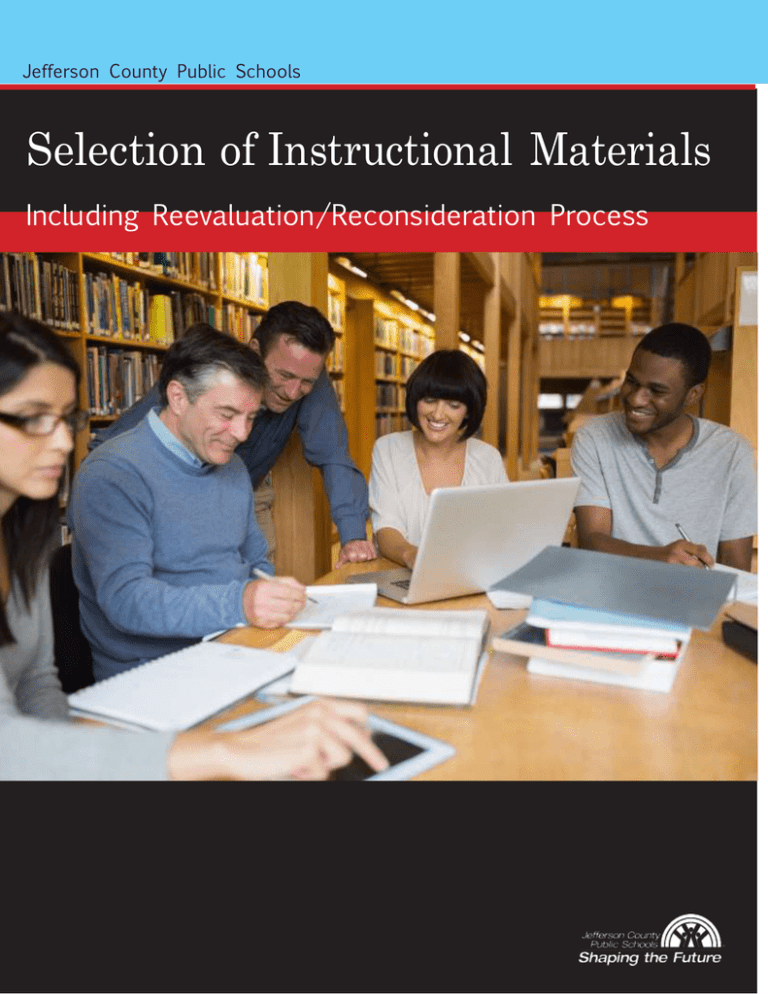
Jefferson County Public Schools Selection of Instructional Materials Including Reevaluation/Reconsideration Process Jefferson County Public Schools Library Media Services Selection of Instructional Materials Including Reevaluation/Reconsideration Process 2015 Equal Opportunity/Affirmative Action Employer Offering Equal Educational Opportunities www.jcpsky.net Louisville, Kentucky SELECTION OF INSTRUCTIONAL MATERIALS Including Reevaluation/Reconsideration Process Library Media Services, Jefferson County Public Schools Louisville, Kentucky 2015 CONTENTS Statement of Policies __________________________________________________________ 1 Procedures ______________________________________________________________________ 2 I. Definitions _________________________________________________________ 2 II. Annual Review of Policy and Procedures _________________________________ 2 III. Responsibility for the Selection of Materials ______________________________ 2 IV. Criteria for Selection of Materials _______________________________________ 3 V. Procedure for Selection, Purchase, and Removal __________________________ 4 VI. Complaint or Challenge of Instructional Materials ___________________________ 5 VII. Review Committee __________________________________________________ 7 Citizen’s Request for Review and Reevaluation of Instructional Materials _________________ 10 APPENDIX Request for Reconsideration of Instructional Materials _______________________________ 12 Checklist for the Review of Instructional Materials—Nonfiction _________________________ 14 Checklist for the Review of Instructional Materials—Fiction and Other Literary Forms________ 17 Statement of Policies Jefferson County Board of Education (JCBE) policies relating to the selection, use, and reconsideration of instructional materials, library materials, and instructional technology include: 02.4242 SCHOOL BUDGET AND PURCHASING (SBDM)—Board Appropriations 03.1321 USE OF SCHOOL PROPERTY (technology-based materials) 08.11 COURSE OF STUDY—Curriculum Framework, Syllabus 08.1353 CONTROVERSIAL ISSUES—Materials, Not Disruptive, Conference with Principal 08.1354 VOTER REGISTRATION AND PARTICIPATION 08.232 INSTRUCTIONAL RESOURCES—Textbook Selection, Sectarian Texts 08.2321 COPYRIGHTED MATERIALS, Electronic Materials 08.2322 REVIEW OF INSTRUCTIONAL MATERIALS 08.2323 ACCESS TO ELECTRONIC MEDIA—Student Safety Procedures and Guidelines, Use of Technology in the Classroom, Social Networking Sites, Responding to Concerns 08.233 LIBRARY MEDIA CENTERS—Selection of Media Materials and Equipment, Gifts, Review 08.234 PREVIEWING MATERIALS 09.423 USE OF ALCOHOL, DRUGS, AND OTHER PROHIBITED SUBSTANCES—Prevention Programs 10.2 CITIZEN SUGGESTIONS AND COMPLAINTS 1 Procedures: I. Definitions A. Instructional materials means print or electronic items that are used, consumed, or worn out in the instructional process to include library books, periodicals, newspapers, audiovisual materials, supplementary books, reference materials, instructional software, and Internet-based resources. B. Text materials means textbooks and other print and nonprint materials provided in multiple copies or electronically for use of a total class or a major segment of such a class. This includes approved categories of instructional materials for purchase with textbook funds (KRS 156 and 157, and 704 KAR 3:455). C. Media means all instructional materials that are not text materials housed in or accessed through library media centers, classrooms, software/applications, and the Jefferson County Public Schools (JCPS) computer network. D. Internet-based resources means any instructional resources accessed through the Internet. This may include, but is not limited to, Web sites, online databases, streamed video, and podcasts. II. Annual Review of Policy and Procedures The principal and/or designee in charge of each attendance center shall annually review with the staff their policy and procedures for the selection of its instructional materials. The staff shall be reminded that the right to object to materials is one granted by policies enacted by the School-Based Decision Making (SBDM) Council and firmly entrenched in law (KRS 160.345). They shall also be reminded of ethical and practical considerations in attempting to handle resident complaints with courtesy and integrity. III. Responsibility for the Selection of Materials “The school council shall determine which textbooks, instructional materials, and student support services shall be provided in the school” (KRS 160.345, Section 2-g). A. The SBDM Council of each school may delegate the responsibility for the selection of instructional materials to the professionally trained and certified staff of the school or to a committee, which could include teachers, parents, students, and administrators. B. Textbook materials are selected through an SBDM-established process following the Selection and Purchasing Process for P-12 (KRS 156) and using the consumer guide by the State Textbook Commission (KRS 156.410). Coordination of the distribution of text materials to students shall follow procedures approved by the school (704 KAR 3:455). C. The SBDM Council shall delegate the responsibility for the selection of library materials for the school library media center to the media librarian. Reputable selection aids shall be used as guides to selection as well as consultation with staff, students, and parents. 2 D. The SBDM Council may delegate the responsibility for the selection of instructional technology to the professionally trained staff of its school. IV. Criteria for Selection of Materials Instructional materials selected for use in the school shall be selected for their strengths rather than rejected for their weaknesses. Materials received as gifts from outside sources will be subject to the same criteria as purchased materials. Selected materials shall conform to the following criteria as they apply: A. Materials shall support and be consistent with district goals and the school’s curricular objectives. B. Materials shall meet high standards of quality in factual content and presentation. C. Materials shall be appropriate for the subject area and for the developmental stage of students for whom the materials are selected. D. Materials shall have aesthetic, academic, literary, and/or social value. E. Materials shall exhibit competent authorship for the subject treated. F. Materials shall be of acceptable technical quality and suitable physical format or able to be accessed via the JCPS computer network. G. Materials shall foster respect for all people, especially minority and ethnic groups, and shall represent realistically our pluralistic society. H. Materials shall be designed to help students gain an awareness and understanding of the contributions made to our civilization by all persons, including women and minority and ethnic groups. I. Materials shall clarify objectively the multiple historical and contemporary forces with their economic, political, and religious dimensions that have operated to the disadvantage or advantage of all persons, including women and minority and ethnic groups. (In special cases, materials containing biased or slanted points of view may be selected to meet certain specific curricular objectives.) J. Materials concerned with racial, religious, sexual, or ethnic differences shall be free from stereotype, caricature, and other characteristics likely to misrepresent, offend, or defame particular segments of the population. K. Materials concerning religion shall be free from intention to indoctrinate the beliefs of any one faith or to belittle any other. L. Materials shall be designed to motivate students and staff to examine their own attitudes and behaviors and to comprehend their own duties, responsibilities, rights, and privileges as participating citizens in a pluralistic, nonsexist society. 3 M. Materials treating controversial issues shall be selected on the basis of their ability to provide students a balanced perspective concerning current events, education, government, history, politics, or any other phase of life. V. Procedure for Selection, Purchase, and Removal A. Media in the Library Media Center 1. The media librarian shall evaluate the school’s existing materials collection using collection analysis data and identified curriculum needs; shall solicit recommendations for purchase from faculty, students, and parents; and shall consult reputable, professionally prepared aids and other appropriate sources in recommending materials for the Library Media Center. 2. The purchase of materials shall follow the Kentucky Model Procurement Code and established procedures and schedules set forth by JCBE policy and the SBDM Council. 3. Gift materials shall be judged and accepted or rejected on the basis of the criteria in Section IV. 4. The media librarian shall supervise the removal of media materials no longer appropriate and the replacement of lost and worn materials that are still of educational value based on established weeding guidelines, such as those available from Library Media Services. B. Text materials 1. The SBDM Council shall determine which text materials shall be provided in the school. Selection shall be consistent with the general criteria for materials selection noted in Section II. 2. Following state guidelines, the SBDM Council shall prepare a Textbook Plan and file the plan with the JCPS Office of the Textbook Coordinator. 3. The purchase of materials shall follow the Kentucky Model Procurement Code and established procedures and schedules set forth by Kentucky law (KRS 156 and 157, and 704 KAR 3:455), JCBE policy, and the SBDM Council. 4. The superintendent or the superintendent’s designee shall notify the Kentucky Department of Education (KDE) that the school textbook plan is on file with the JCPS Office of the Textbook Coordinator. 5. The SBDM shall establish procedures for the removal of text materials no longer appropriate and the replacement of lost and worn materials that are still of educational value. 4 C. Internet-based and electronic resources 1. The Computer Education Support (CES) Unit, working with district content specialists, will make recommendations for instructional software applications. 2. Local schools should select those programs that meet the requirements of their instructional programs. Due to the wide variety of software programs installed in schools, the CES Unit cannot guarantee support of all applications. 3. The purchase of materials shall follow the Kentucky Model Procurement Code and established procedures and schedules set forth by JCBE policy and the SBDM Council. 4. Gift materials shall be judged and accepted or rejected on the basis of the criteria in Section IV. 5. The School Technology Coordinator (STC) shall supervise the removal of electronic resources no longer appropriate. VI. Complaint or Challenge of Instructional Materials Despite the quality of the selection process, occasional objections to instructional materials will be made. The JCBE supports principles of intellectual freedom inherent in the First Amendment to the Constitution of the United States and expressed in the Library Bill of Rights of the American Library Association (ALA) and the Students’ Right to Read of the National Council of Teachers of English (NCTE). When materials are questioned, the principles of intellectual freedom, the right to access of materials, and the integrity of the staff must be defended rather than the materials. The process for the review and reevaluation of instructional materials is the responsibility of the SBDM Council. The SBDM Council may solicit a recommendation from an appointed SBDM Review Subcommittee or from a JCPS Review Committee appointed by the JCPS superintendent. It is the responsibility of the SBDM Council to determine whether it will serve as the Review Committee or will solicit a recommendation from an appointed SBDM Review Subcommittee or from a JCPS Review Committee appointed by the JCPS superintendent. The challenged materials will be retained or withdrawn as mandated by the decision of the SBDM Council. A. LEVEL I: Initial Concern 1. The complainant states to the local school principal, unit head, or a designee a concern related to instructional materials. 2. The principal, unit head, or designee schedules with the complainant a conference intended to resolve the complaint. 3. Within five business days following the conference, the principal, unit head, or designee provides the complainant a written decision concerning use of the instructional materials. (During this time, the materials will remain in use.) 5 Notes: At Level I, the principal, unit head, or designee will attempt to resolve the issue informally by explaining the rationale for including the materials in the instructional program. The explanation should focus on the selection procedures and criteria, qualification of persons selecting the materials, the place the challenged materials occupy in the educational program, the materials’ intended educational usefulness, and additional information regarding their use. B. LEVEL II: Written Request for Review and Reevaluation If, after consultation at Level I, the complainant wishes to file a written request for review and reevaluation of the instructional materials, the principal, unit head, or designee assists the complainant in taking the following steps: 1. The complainant completes a Request for Reconsideration of Instructional Materials form (Appendix A), signs the form, and files it with the principal, unit head, or designee. Notes: Access to challenged instructional materials shall not be restricted during the reconsideration process. In unusual circumstances, however, access may be restricted temporarily by unanimous agreement of the SBDM Council. 2. The principal, unit head, or designee shall follow procedures established by the SBDM Council. 3. Within five business days of receipt of the complaint, the principal, unit head, or designee shall inform the SBDM Council, SBDM Review Subcommittee, or JCPS Review Committee of receipt of the complaint and shall schedule a meeting according to established procedures. 4. Within ten days of notification of the complaint, the SBDM Council, SBDM Review Subcommittee, or JCPS Review Committee shall meet to deliberate. Recommendations from the SBDM Review Subcommittee or JCPS Review Committee shall be provided in writing to the SBDM Council. Within five days of the deliberation, the SBDM Council shall make a final decision concerning the complaint. 5. Within five business days of rendering a final decision (a total of 25 business days from the principal, unit head, or designee’s initial receipt of the written complaint), the SBDM Council shall notify the complainant, in writing, concerning disposition of the complaint. C. LEVEL III: Appeal In the event the complainant is not satisfied with the decision of the SBDM Council, the complainant may appeal to the JCPS SBDM Office. 1. The complainant presents to the SBDM Office a written request for review of the complaint. 6 2. The SBDM Office shall render a decision regarding the disposition of the complaint according to established procedures. (Further appeals may be made to the State Board for Elementary and Secondary Education Office of Education Accountability.) VII. Review Committee A. Purpose The purpose of the Review Committee, whether the SBDM Council, SBDM Review Subcommittee, or JCPS Review Committee, shall be to conduct a review of the materials as requested and to recommend to the SBDM Council a disposition concerning the materials. B. Membership 1. The SBDM Council Review Committee will consist of its regular membership. 2. The SBDM Review Subcommittee shall be appointed according to established SBDM policy. 3. The JCPS Review Committee shall be appointed by the superintendent and will include, but not be limited to, the following members: One One One One One One+ Three Teacher School Media Librarian District’s Director of Library Media Services, who shall serve as chairperson Director of Curriculum and Assessment Principal or principal’s designee from the related level (elementary, middle, secondary) Content area specialists as appropriate Members of the community—one from each geographic region C. Suggested Procedure for Meetings 1. The chairperson: a. Distributes copies of the complainant’s written request form. b. Distributes copies of the challenged materials as available. c. Gives the complainant or group spokesperson an opportunity to talk about and expand on the written request. d. Distributes reputable, professionally prepared reviews of the materials as available. 2. The Review Committee then: a. Reads, views, or listens to the materials in their entirety. 7 b. Checks general acceptance of the materials by reading reviews and consulting reputable recommended lists. c. Determines the extent to which the materials support the curriculum. d. Uses the appropriate Checklist for the Review of Instructional Materials (see Appendices B and C) as a guide in judging the materials for their strength and value as a whole and not in part. 3. The committee may: a. Invite interested persons, including the complainant, to have an opportunity to share their views. b. Request that individuals with special knowledge be present to give information to the committee. 4. The committee shall: a. Inform the complainant concerning the status of the complaint through the committee reconsideration process. b. Give the complainant and known interested parties appropriate notice of the Review Committee meeting. D. SBDM Council Decision The committee shall make its decision concerning a recommendation in open session. The SBDM Council’s final decision will be as follows: 1. To take no removal action, 2. To remove all or part of the challenged materials from the total school environment, 3. To allow students to use alternate titles, approved by school personnel involved, or 4. To limit the educational use of the challenged materials. The sole criterion for the final recommendation is the appropriateness of the materials for their intended educational use. The written decision and its justification shall be forwarded to the complainant. The challenged materials will be retained or withdrawn as mandated by the decision of the SBDM Council. (A decision to sustain a challenge shall not be interpreted as a judgment of irresponsibility on the part of the professionals involved in the original selection and/or use of the materials, or irresponsibility on the part of the members of the Review Committee.) 8 E. Miscellaneous 1. The decision of the SBDM Council is intended for the school it serves and does not apply to instructional materials in any other school. 2. Requests to reconsider materials that have previously been before the SBDM Council must receive the approval of a majority of its members before the materials will again be reconsidered. Every reconsideration request form shall be acted upon by the SBDM Council. 3. SBDM Council members or Review Committee or Subcommittee members directly associated with the selection, use, or challenge of the materials in question shall be excused during the deliberation on such materials. A temporary replacement for the excused member may be appointed, but such replacement shall be of the same general qualifications of that person excused. 9 CITIZEN’S REQUEST FOR REVIEW AND REEVALUATION OF INSTRUCTIONAL MATERIALS Each JCPS school endeavors to meet the needs of all its students by providing on all levels a wide range of instructional materials having diversity of appeal and different points of view. With respect to instructional materials, the JCBE and the SBDM Council support the principles of intellectual freedom inherent in the First Amendment to the Constitution of the United States and in the Library Bill of Rights and the Students’ Right to Read of the NCTE. Despite the quality of instructional materials or the credibility of the process used for selecting instructional materials, occasional objections will arise. Therefore, in order to facilitate the resolution of any concerns related to instructional materials, the SBDM Council provides the following procedure for review and reevaluation. Level I—Initial Concern 1. A person having a complaint related to instructional materials states the complaint to a local school principal or unit head or a designee. 2. The school official to whom the complaint is stated schedules a conference with the complainant to discuss the instructional materials. 3. The complainant and the school official discuss the instructional materials during the scheduled conference. 4. Within five business days following the conference, the school official provides the complainant a written decision concerning the complaint. Level II—Written Request for Review and Reevaluation 1. If a complainant is not satisfied with the school official’s decision at Level I, the school official will assist the complainant in filing, with the SBDM Council, a written request for review and reevaluation of the instructional materials. 2. The SBDM Council accepts the written request for review and reevaluation of instructional materials with the purpose of rendering a decision concerning the complaint. (When appropriate, the SBDM Council forwards the request to the SBDM Review Subcommittee or District Review Committee.) 3. Within 25 business days of receiving the written request for review and reevaluation of the instructional materials, the SBDM Council notifies, in writing, the complainant concerning disposition of the complaint. Level III—Appeal 1. In the event the complainant is not satisfied with the SBDM Council’s decision regarding the instructional materials, the complainant may file with the JCPS SBDM Office a written request for the review of the complaint. 2. The SBDM Office shall render a decision regarding the disposition of the complaint according to established procedures. 10 Notes: The SBDM Office considers appeals requesting the review of decisions related to the use of instructional materials to be serious matters. Therefore, persons requesting such reviews are advised to present carefully documented, factual information substantiating their claims. Only upon recommendation of the SBDM Council shall access to challenged instructional materials be restricted during the reconsideration process. 11 APPENDIX A REQUEST FOR RECONSIDERATION OF INSTRUCTIONAL MATERIALS School: ______________________________________________________________________ Request Initiated by: ______________________________________________________________________ Telephone: ____________________ Address:_______________________________________ City/State/ZIP: ________________________________________________________________ Complainant represents: Himself/Herself Name of organization Identify other person or group Please check type of materials: Audio recording Book Computer program Internet-based resource Pamphlet Periodical (magazine) Periodical (newspaper) Video recording Other _____________ Title:_______________________________________________________________________ Author:_____________________________________________________________________ Publisher, Producer, or URL:____________________________________________________ The following questions are to be answered after the complainant has read, viewed, or listened to the school instructional materials in their entirety. If sufficient space is not provided, attach additional sheets. (Please sign your name to each additional attachment.) 1. These instructional materials were: Required by an instructor Selected by your child 2. Have you discussed these materials with the teacher or media librarian who selected, assigned, or used them? Yes No If yes, did the general purpose for the use of the work seem a suitable one for you? Yes No 3. Have you been able to learn what reviewers and/or other students have written about these materials? Yes No 4. To what in the materials do you object? (Please be specific. Cite pages, film sequence, etc.) _________________________________________________________________________ _________________________________________________________________________ 12 5. What do you believe is the theme or purpose of these materials? _________________________________________________________________________ _________________________________________________________________________ 6. What do you feel might be the result of a student using these materials? _________________________________________________________________________ _________________________________________________________________________ _________________________________________________________________________ 7. What, if anything, do you find good in these materials? _________________________________________________________________________ _________________________________________________________________________ _________________________________________________________________________ 8. For what age group would you recommend these materials? _________________________________________________________________________ 9. What other instructional materials of the same subject or format would you recommend? _________________________________________________________________________ _________________________________________________________________________ 10. What would you like your school to do about this work? _________________________________________________________________________ _________________________________________________________________________ Signature of Complainant: ________________________________ Date: __________________ Please return completed form to the school principal. 13 APPENDIX B CHECKLIST FOR THE REVIEW OF INSTRUCTIONAL MATERIALS NONFICTION School: Please check type of materials: Audio recording Book Computer program Internet-based resource Pamphlet Periodical (magazine) Periodical (newspaper) Video recording Other _____________ Title:_______________________________________________________________________ Author:_____________________________________________________________________ Publisher, Producer, or URL:____________________________________________________ A. Purpose 1. What is the overall purpose of these materials? ______________________________ ___________________________________________________________________ ___________________________________________________________________ B. Authenticity 1. Is the author competent and qualified in the field? Yes No 2. What is the reputation and significance of the author and publisher/producer in this field? _______________________________________________________________ ___________________________________________________________________ ___________________________________________________________________ 3. Are the materials up to date? Yes No 4. Are information sources well documented? Yes No 5. Are translations and retellings faithful to the original? Yes No 14 C. Appropriateness 1. Do the materials promote the educational goals and objectives of the school’s curriculum? Yes No 2. Are they appropriate to the level of instruction intended? Yes No 3. Are the illustrations appropriate to the subject and age levels? Yes No D. Content 1. Is the content of these materials well presented by providing adequate scope, range, depth, and continuity? Yes No 2. Do these materials present information not otherwise available? Yes No 3. Do these materials give a new dimension of direction to its subject? Yes No E. Reviews List reputable selection aids in which these materials were reviewed: 1. Source of review: _____________________________________________________ Date of review: _______________________________________________________ Favorably reviewed Unfavorably reviewed 2. Source of review: _____________________________________________________ Date of review: _______________________________________________________ Favorably reviewed Unfavorably reviewed 3. Source of review: _____________________________________________________ Date of review: _______________________________________________________ Favorably reviewed Unfavorably reviewed F. Additional Comments: _________________________________________________________________________ _________________________________________________________________________ _________________________________________________________________________ 15 Recommendation by Review Committee for treatment of challenged materials: To take no removal action, To remove all or part of the challenged materials from the total school environment, To allow students to use alternate titles, approved by school personnel involved, or To limit the educational use of the challenged materials. Comments:___________________________________________________________________ ____________________________________________________________________________ Date:________________________ Signatures of Review Committee Members: ___________________________________ ___________________________________ ___________________________________ ___________________________________ ___________________________________ ___________________________________ ___________________________________ ___________________________________ Decision by the School-Based Decision Making (SBDM) Council for the treatment of the challenged materials: To take no removal action, To remove all or part of the challenged materials from the total school environment, To allow students to use alternate titles, approved by school personnel involved, or To limit the educational use of the challenged materials. Comments:___________________________________________________________________ ____________________________________________________________________________ Date: ___________________________ Signatures of SBDM Council Members: ___________________________________ ___________________________________ ___________________________________ ___________________________________ ___________________________________ ___________________________________ ___________________________________ ___________________________________ 16 APPENDIX C CHECKLIST FOR THE REVIEW OF INSTRUCTIONAL MATERIALS FICTION AND OTHER LITERARY FORMS Title:_____________________________________________________________________ Author:___________________________________________________________________ Publisher, Producer, or URL:__________________________________________________ A. Purpose 1. What is the purpose, theme, or message of the materials? How well does the author/producer/composer accomplish this purpose? ___________________________________________________________________ ___________________________________________________________________ ___________________________________________________________________ 2. If the story is fantasy, is it the type that has imaginative appeal and is suitable for children? Yes No For young adults? Yes No If both are marked no, for what age group would you recommend the story? _______ 3. Will the reading and/or viewing and/or listening to the materials result in more compassionate understanding of human beings? Yes No 4. Does the story offer an opportunity to better understand and appreciate the aspirations, achievements, and problems of various minority groups? Yes No 5. Are any questionable elements of the story an integral part of a worthwhile theme or message? Yes No B. Content 1. Does a story about modern times give a realistic picture of life as it is now? Yes No Not applicable 2. Does the story avoid an oversimplified view of life, one that leaves the reader with a general feeling that life is sweet and rosy or ugly and meaningless? Yes No 17 3. When factual information is part of the story, is it presented accurately? Yes No Not applicable 4. Is prejudicial appeal readily identifiable by the potential reader? Yes No Not applicable 5. Are concepts presented in a way that is appropriate to the ability and maturity of the potential readers? Yes No 6. Do characters speak in a language true to the period and section of the country in which they live? Yes No 7. Do the materials offend in some special way a particular demographic group by the way they present either the chief character or any of the minor characters? Yes No 8. Is there preoccupation with sex, violence, cruelty, brutality, or aberrant behavior that would make these materials inappropriate for children? Yes No 9. If there is use of offensive language, is it appropriate to the purpose of the text for children? Yes No For young adults? Yes No 10. Are the materials free from derisive names and epithets that could be offensive? Yes No 11. Are the materials well written or produced? Yes No 12. Does the story give a broader understanding of human behavior without stressing differences of class, race, color, sex, education, religion, or philosophy in any adverse way? Yes No 13. Do the materials make a significant contribution to the history of literature or ideas? Yes No 14. Are the illustrations appropriate and in good taste? Yes No 15. Are the illustrations realistic in relation to the story? Yes No 18 C. Reviews List reputable selection aids in which these materials were reviewed: 1. Source of review: _____________________________________________________ Date of review: _______________________________________________________ Favorably reviewed Unfavorably reviewed 2. Source of review: _____________________________________________________ Date of review: _______________________________________________________ Favorably reviewed Unfavorably reviewed 3. Source of review: _____________________________________________________ Date of review: _______________________________________________________ Favorably reviewed Unfavorably reviewed D. Additional Comments: _________________________________________________________________________ _________________________________________________________________________ _________________________________________________________________________ _________________________________________________________________________ _________________________________________________________________________ _________________________________________________________________________ _________________________________________________________________________ _________________________________________________________________________ Recommendation by Review Committee for treatment of challenged materials: To take no removal action, To remove all or part of the challenged materials from the total school environment, To allow students to use alternate titles, approved by school personnel involved, or To limit the educational use of the challenged materials. Comments:___________________________________________________________________ ____________________________________________________________________________ Date: ___________________________ 19 Signatures of Review Committee Members: ___________________________________ ___________________________________ ___________________________________ ___________________________________ ___________________________________ ___________________________________ ___________________________________ ___________________________________ Decision by the SBDM Council for the treatment of the challenged materials: To take no removal action, To remove all or part of the challenged materials from the total school environment, To allow students to use alternate titles, approved by school personnel involved, or To limit the educational use of the challenged materials. Comments:___________________________________________________________________ ____________________________________________________________________________ Date: ___________________________ Signatures of SBDM Council Members: ___________________________________ ___________________________________ ___________________________________ ___________________________________ ___________________________________ ___________________________________ ___________________________________ ___________________________________ 20
